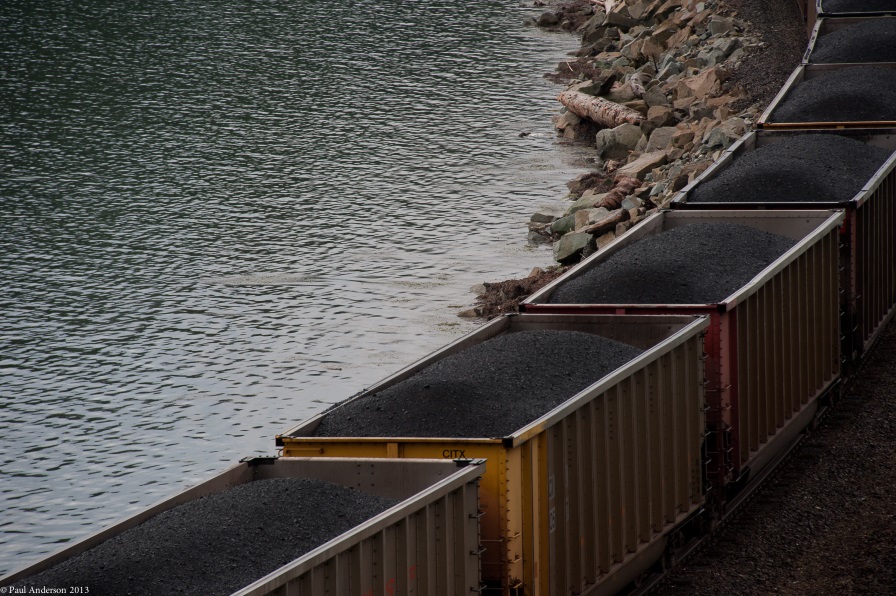Time for B.C. government to end silence on coal exports

The Georgia Straight
By Eoin Madden
December 6, 2013
Before the discussion started heating up around building a new coal terminal in Metro Vancouver, I was blissfully unaware of the impact diesel particulates and fugitive coal dust could have on our bodies.
At a town hall meeting in Surrey, I met a woman who believed that her chronic respiratory illness was likely associated with her proximity to increasing coal train traffic. A powerful explanation from respected physician Dr. Frank James that evening helped connect the dots about the risks for those living close to the tracks. Had Dr. James not taken the time out from his busy practice to impart his knowledge on some complete strangers, I would not know the true significance of the mile-and-a-half-long coal trains idling six blocks away from my bedroom window.
Dr. James is not alone in raising the alarm about the damage the proposed Fraser Surrey Docks (FSD) coal facility could cause our communities. Our very own medical health officials have been criticizing the project’s assessment for its inadequate review of the health impacts, with little success. Port Metro Vancouver, the body tasked with approving the new facility, has refused to acknowledge that the review process should be more comprehensive. Our provincial Nurses’ Union has also felt obligated to voice its concerns, taking the unusual step of writing to the port.
The notion that projects like FSD can cause serious harm to our communities was taken to a whole new level by a recent report from the non-profit B.C. Healthy Communities, about the health impacts of climate change in B.C. Its conclusion: the majority of physicians surveyed believed climate change is already affecting the health of B.C.’s communities, and will continue to impact human health issues over time.
When fully operational, the Fraser Surrey Docks terminal will be responsible for the export of approximately 16 million tonnes of climate-changing greenhouse gases every single year. That’s more than a quarter of the whole province’s current contribution to the climate crisis, and a legacy none of us can afford to hand down to our youth.
Community health is a matter governed by provincial agencies, an arrangement guaranteeing our ability to thrive in the way we always have. Despite increasing community opposition in the Lower Mainland, the provincial government has remained conspicuously absent from the debate. We’re told that port issues are strictly federal, but this is not true on two grounds—the provincial government must be satisfied that health risks are adequately allayed, and it must grant the operating licence for the proposal’s associated barge unloading and transfer facility on Texada Island.
Our provincial government has recently reiterated its intention to be a leader in the area of clean energy, even going so far as to participate in a regional climate initiative with our U.S. Pacific coast neighbours. The lower carbon intensity of gas as an energy source, we are told, is the reason why we can greatly expand our exports and still maintain our position as a clean energy leader. Such claims are rightly under dispute, but there is no avoiding the “clean” and “green” messaging coming from the province about our energy future. The question I am left with is this: how can the provincial government maintain its claim on climate leadership, yet turn its head on a project designed to supply massive amounts of the world’s dirtiest fuel?
The public comment period for the Fraser Surrey Docks environmental impact assessment is now open. In the absence of a full independent public hearing on the proposal and its climate and health impacts, we’re left with no option but to submit our feedback before the quickly-approaching deadline on December 17. Whether the port will give our comments the serious consideration they deserve remains to be seen.
The social licence necessary for constructing this coal terminal has been clearly denied by our communities. That point has been made clear by the 24,000 petition signatures gathered to date by community members across the Lower Mainland, who agree that the FSD coal facility should never happen.
It is time for our provincial government to acknowledge this fact rather than remain complicit. B.C. can demand an independent hearing on health impacts. It should go further and refuse all licences under its remit that would enable this proposal to become a reality. From here on in, silence equals support.